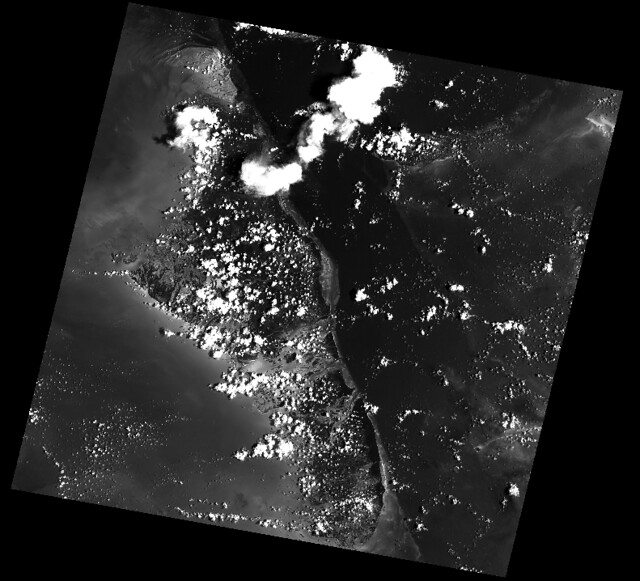Fast and direct raster I/O for Python programmers who use Numpy
Project description
Clean and fast and geospatial raster I/O for Python programmers who use Numpy.
This library is designed for developers who want to read raster datasets into Numpy arrays or buffers, operate on them in Python (or Cython), and write the results out to new GeoTIFF files.
Rasterio employs GDAL under the hood for file I/O and raster formatting. It aims to let you get more done with less code and fewer bugs than you can with other GDAL interfaces.
Example
Here’s an example of the basic features rasterio provides. Three bands are read from an image and summed to produce something like a panchromatic band. This new band is then written to a new single band TIFF.
import numpy
import rasterio
import subprocess
# Register format drivers with a context manager
with rasterio.drivers():
# Read raster bands directly to Numpy arrays.
#
with rasterio.open('rasterio/tests/data/RGB.byte.tif') as src:
b, g, r = map(src.read_band, (1, 2, 3))
# Combine arrays using the 'iadd' ufunc. Expecting that the sum
# will exceed the 8-bit integer range, initialize it as 16-bit.
# Adding other arrays to it in-place converts those arrays up
# and preserves the type of the total array.
total = numpy.zeros(r.shape, dtype=rasterio.uint16)
for band in (r, g, b):
total += band
total /= 3
assert total.dtype == rasterio.uint16
# Write the product as a raster band to a new 8-bit file. For
# keyword arguments, we start with the meta attributes of the
# source file, but then change the band count to 1, set the
# dtype to uint8, and specify LZW compression.
kwargs = src.meta
kwargs.update(
dtype=rasterio.uint8,
count=1,
compress='lzw')
with rasterio.open('example-total.tif', 'w', **kwargs) as dst:
dst.write_band(1, total.astype(rasterio.uint8))
# At the end of the ``with rasterio.drivers()`` block, context
# manager exits and all drivers are de-registered.
# Dump out gdalinfo's report card and open the image.
info = subprocess.check_output(
['gdalinfo', '-stats', 'example-total.tif'])
print(info)
subprocess.call(['open', 'example-total.tif'])
The rasterio.drivers() function and context manager are new in 0.5. The example above shows the way to use it to register and de-register drivers in a deterministic and efficient way. Code written for rasterio 0.4 will continue to work: opened raster datasets may manage the global driver registry if no other manager is present.
Simple access is provided to properties of a geospatial raster file.
with rasterio.drivers():
with rasterio.open('rasterio/tests/data/RGB.byte.tif') as src:
print(src.width, src.height)
print(src.crs)
print(src.transform)
print(src.count)
print(src.indexes)
# Output:
# (791, 718)
# {u'units': u'm', u'no_defs': True, u'ellps': u'WGS84', u'proj': u'utm', u'zone': 18}
# [101985.0, 300.0379266750948, 0.0, 2826915.0, 0.0, -300.041782729805]
# 3
# [1, 2, 3]Rasterio also affords conversion of GeoTIFFs, on copy, to other formats.
with rasterio.drivers():
rasterio.copy(
'example-total.tif',
'example-total.jpg',
driver='JPEG')
subprocess.call(['open', 'example-total.jpg'])Dependencies
C library dependecies:
GDAL
Python package dependencies (see also requirements.txt):
Numpy
setuptools
Development also requires (see requirements-dev.txt)
Cython
nose
Installation
Rasterio is a C extension and there are not yet any binary releases. You’ll need a working compiler (XCode on OS X, etc).
$ pip install Numpy
$ pip install rasterioThe Numpy headers are required to run the rasterio setup script. Numpy has to be installed first.
Testing
From the repo directory, run nosetests.
$ nosetestsLicense
See LICENSE.txt
Changes
See CHANGES.txt
Project details
Release history Release notifications | RSS feed
Download files
Download the file for your platform. If you're not sure which to choose, learn more about installing packages.
Source Distribution
File details
Details for the file rasterio-0.5.tar.gz.
File metadata
- Download URL: rasterio-0.5.tar.gz
- Upload date:
- Size: 245.0 kB
- Tags: Source
- Uploaded using Trusted Publishing? No
File hashes
| Algorithm | Hash digest | |
|---|---|---|
| SHA256 | cca7c96d35aa55e4fba5dec490c039a053625b2eaa19fafdb184b963859a536c |
|
| MD5 | 69ead924dd35e8a38fd652e6471dd5eb |
|
| BLAKE2b-256 | 5414e40aaf6ea678f93348b3f011dd6653ed9d70ca71f5ea1316439eeb98b268 |











